democracynow.org
Stories:

Keep It in the Ground: Author Terry Tempest Williams Buys 1,750 Acres of Oil & Gas Leases in Utah
In Utah, more than 100 protesters disrupted a federal auction of oil and gas leases, spontaneously bursting into song until they were forced to leave. Author and activist Terry Tempest Williams, registered as Bidder 19, successfully bought rights to 1,750 acres of land to spare it from fossil fuel extraction. When asked by a Bureau of Land Management official if she was making a "legitimate bid for energy development," Tempest Williams said: "You can’t define what energy is for us. Our energy development is fueling a movement." Terry Tempest Williams joins us from Salt Lake City.
TRANSCRIPT
This is a rush transcript. Copy may not be in its final form.
AMY GOODMAN: We turn now to Utah, where more than a hundred protesters disrupted a federal auction of oil and gas leases Tuesday, spontaneously bursting into song until they were forced to leave. This was the scene at the Salt Palace Convention Center in Salt Lake City.
PROTESTERS: Your great-granddaughter, your great-granddaughter, your great-granddaughter, your great-granddaughter, your great-granddaughter, your great-granddaughter, your great-granddaughter, your great-granddaughter.
AMY GOODMAN: The protesters, from a coalition of environmental groups that included Canyon Country Rising Tide, Elders Rising, the Sierra Club, called for an end to fossil fuel development on public lands as part of the Keep It in the Ground movement. Noted Utah author and activist Terry Tempest Williams attended the auction in support of the groups. She registered as Bidder 19, a move that raised suspicion among federal officials, who warned that she could be arrested if she misrepresented herself. She successfully ended up buying rights to over 1,700 acres of land to spare it from fossil fuel extraction. Climate activist Tim DeChristopher spent close to two years in prison when he posed as a bidder in a similar move in 2008.
To talk about what happened next, we’re joined by, well, Terry Tempest Williams herself in Salt Lake City.
Welcome to Democracy Now!, Terry. It’s great to have you with us. Explain what took place and what it meant to be Bidder 19.
TERRY TEMPEST WILLIAMS: First of all, it’s great to be on your show, Amy. Thank you for all you do.
As you mentioned, I was there with over a hundred other protesters in Salt Lake City, part of the movement to keep it in the ground. What was it like to be Bidder 19? I can tell you I don’t have the courage of Bidder 70. But I think each of us, in our own way, can both enter the open space of democracy. And I think what was interesting was to see the protesters and the impact that they had on the auction. They did disrupt the auction, through singing.
AMY GOODMAN: Now, Terry, just to stay—take a step back—and Bidder 70 was Tim DeChristopher, who ended up in prison for close to two years. But for a lot of people, us city dwellers, we don’t even understand what these auctions are.
TERRY TEMPEST WILLIAMS: Right.
AMY GOODMAN: So explain what it is that you went into, that the protesters disrupted, and that you ended up being a very large landowner or leaser in by the time you walked out.
TERRY TEMPEST WILLIAMS: Utah is 63 percent public lands. Half of the remaining fossil fuels in this country exist below our public lands, America’s public lands. Every so often, the Bureau of Land Management conducts an oil and gas lease that is open for bid. These lands go up for lease auction, that gives the highest bidder the opportunity to speculate, to drill for oil and make an enormous profit, as we know.
It’s a secret society, and I think that was the thing that was so stunning, sitting there as Bidder 70. It’s oil and gas companies. It’s very secretive. If you talk to them, they won’t tell you who they’re representing.
And then the auctioneer begins. A parcel is shown. It may be—in our case, it was 800 acres, and the bidding begins at two dollars an acre. And I think the thing that was so heartbreaking for me and shocking is you hear these lands go up, and they’re commodities, they’re a piece of meat. They’re our public lands. And one of the auctioneers—the auctioneer said, you know, "$2? Anybody want $2? $2.25? $2.50? Anybody want $2.50? $3?" And then he says, "Come on, men. This is a lot of scenery going to waste. $3? Anyone going to $3? $3.25?" And at that point, it becomes very emotional for me, because as one who has loved public lands, for those of us who see them as the public commons, to be thrown into the public auction—that is not public at all, but a secret society for oil and gas companies—is disheartening, to say the least.
AMY GOODMAN: Explain what they do with this land, when they do bid on it and get it.
TERRY TEMPEST WILLIAMS: Well, we’ll find out. You’re given this lease for 10 years. And through good faith and by compliance to the law, you’re expected to develop this land and produce oil or gas or fracking or coal.
When the agents saw that I was there, it was a process of intense intimidation, saying, "If you’ve misrepresented yourself, you will go to prison. Are you aware of this? And if you are not a legitimate energy development company, then you’re misrepresenting yourself." And I said, "But I’m an American citizen. Don’t I have the right to be in this 'public' auction?" And he said, "I’m just saying, are you aware of what you have signed, and if you’re misrepresenting yourself, you will go to prison." At that point, Agent Love, who was at Tim DeChristopher’s trial, said, "Terry, we don’t want you to get into trouble." And I said, "I am within my rights. This is a legal act. I can be here at this public auction. Correct?" And he said, "Correct." And I bore witness and held that space, with the other protesters until they were asked to leave because of singing.
AMY GOODMAN: Explain what property you got, this 1,700 acres that you bid on and won.
TERRY TEMPEST WILLIAMS: It’s so interesting, Amy, to actually participate in the process, and I can’t tell you what I’ve learned. Any United States citizen 18 years or older with a credit card and a driver’s license can purchase our public lands in a fire sale for $1.50 an acre. So, Brooke, my husband, we went into the BLM office with a broker, who in our case happened to be David Terry, who was director of the School Trust Lands. And we sat down. We got out maps. We looked at the parcels that were remaining. There were 25 parcels remaining, in a fire sale. And Brooke and I chose to purchase an oil and gas lease on 800 acres in Grand County, where we live, just outside of Castle Valley. It’s approximately 14 miles northeast of Arches National Park. And I just think it’s stunning to realize that in our centennial year celebrating our national parks, our public lands, America’s public lands, are being sold for $1.50 an acre to—on sale.
So, we were excited about exploring the energy on these 800 acres. There are white-tailed prairie dogs and Gunnison’s prairie dogs, which I happen to care enormously about, ferruginous hawks, pronghorn habitat, migratory flyway, sage, rabbitbrush. So we’re so excited to explore and see what kind of energy development, including the development of the movement, can create. We intend on complying with the law, and we have this lease for 10 years. And we have created an LLC, Tempest Exploration, and we’re excited to have many of our students in the environmental humanities program at the University of Utah be part of our board of directors.
AMY GOODMAN: As Terry Tempest Williams redefines energy, well, last month, Utah Congressman Rob Bishop and Congressmember Jason Chaffetz, both Republicans, released a draft public lands bill that, if passed, would affect 18 million acres of public lands in eastern Utah. Critics say the measure would create new oil and gas drilling zones that are exempted from environmental protections and hand over large areas of national park lands to private and state control. In a statement issued after releasing the bill, Congressman Bishop said, quote, "Our goal has always stayed constant. We will conserve areas worthy of conservation. We will guarantee outdoor recreation for all Utahns. We will enhance economic development to fund Utah schools and create good jobs. We will provide certainty by ending the litigation and mindless debates. That certainty will allow everyone to plan for the future without outside groups imposing their misguided will," unquote. Terry Tempest Williams, what’s your response to the legislation?
TERRY TEMPEST WILLIAMS: It’s a fraud. And what’s so ironic is, an American citizen, you know, can apply to—
AMY GOODMAN: Whoops, it looks like we have just lost Terry Tempest Williams. We’ll try to get her back. We’ll go to break for the moment. Terry Tempest Williams is the famous author, who became, oh, Bidder 19 this week. She’s the author of more than a dozen books on environmental issues and a professor of environmental humanities at the University of Utah. Her latest book is When Women Were Birds. This is Democracy Now! We’ll be back in a minute.
[break]
AMY GOODMAN: "No More Auction Block for Me," Sweet Honey in the Rock. This is Democracy Now!, democracynow.org, The War and Peace Report. I’m Amy Goodman. It looks like Terry Tempest Williams in Salt Lake City will not be reconnected by satellite, as we move on to our next segment.
... Read More →
Apple vs. the FBI: Inside the Battle Snowden Calls "The Most Important Tech Case in a Decade"
A major debate over privacy and online encryption has erupted after the computer giant Apple announced it will resist a court order to help the FBI break into an iPhone recovered from one of the San Bernardino shooters. Citing an 18th century law, federal prosecutors requested a court order to compel Apple to assist the investigation in unlocking the phone of Syed Rizwan Farook. In December, Farook and his wife killed 14 and injured 22 others in San Bernardino. On Tuesday night, Apple CEO Tim Cook published an open letter to customers announcing his company’s decision to fight the court order. "Up to this point, we have done everything that is both within our power and within the law to help them," Cook said. "But now the U.S. government has asked us for something we simply do not have, and something we consider too dangerous to create. They have asked us to build a backdoor to the iPhone." We speak to Alex Abdo, staff attorney at the National Security Project at the American Civil Liberties Union.
TRANSCRIPT
This is a rush transcript. Copy may not be in its final form.
AMY GOODMAN: A major debate over privacy and online encryption has erupted after the computer giant Apple announced it will resist a court order to help the FBI break into an iPhone recovered from one of the San Bernardino shooters. Federal prosecutors requested a court order, citing an 18th century law, to compel Apple to assist the investigation into unlocking the phone of Syed Rizwan Farook. In December, Farook and his wife killed 14 and injured 22 others in San Bernardino. The two were killed in a shootout with police. FBI Director James Comey recently revealed the agency has been unable to access data on Farook’s phone.
JAMES COMEY: So it is a big problem for law enforcement, armed with a search warrant, when you find a device that can’t be opened, even though the judge said there’s probable cause to open it. As I said, it affects our counterterrorism work. You know, with San Bernardino, a very important investigation to us, we still have one of those killers’ phones that we have not been able to open. And it’s been over two months now, we’re still working on it.
AMY GOODMAN: On Tuesday night, Apple CEO Tim Cook published an open letter to customers announcing Apple’s decision to fight the court order. Cook wrote, quote, "We are challenging the FBI’s demands with the deepest respect for American democracy and a love of our country. We believe it would be in the best interest of everyone to step back and consider the implications," he said.
Tim Cook went on to write, "Up to this point, we have done everything that is both within our power and within the law to help them. But now the U.S. government has asked us for something we simply do not have, and something we consider too dangerous to create. They have asked us to build a backdoor to the iPhone," he said.
To talk more about the dispute between Apple and the FBI, and the larger debate over encryption and cybersecurity, we’re joined by Alex Abdo. He’s staff attorney at the National Security Project at the American Civil Liberties Union.
Welcome to Democracy Now!, Alex.
ALEX ABDO: Thanks for having me.
AMY GOODMAN: So, will the FBI, will the government, take a bite out of the Apple?
ALEX ABDO: That is the question. And I think that the courts are going to ultimately side with Apple, because what the government is asking for in this case is a bridge too far. It’s an unprecedented demand that Apple not just give the government information it has, but that Apple write software that hacks into one of its users’ phones. And that is an unprecedented authority that the government seeks, and it’s not an authority that you can limit to just this case. This is not just about this one phone, it’s about every phone.
AMY GOODMAN: So, explain how it works. And is it true that why the government can’t break into it is because of a change that Apple made just, what, in 2014?
ALEX ABDO: Well, this is an old phone, so it’s a little bit unclear, you know, to people on the outside, the relationship between this phone and the more recent changes Apple has made. But basically what’s going on is the phone is locked using a passcode, and there are protections built into the device to prevent people from trying, you know, every password under the sun to try to break into it. And the government wants Apple to write software that would hack those protections, that would undermine them, so that the government can break into the phone.
And that’s what’s different about this case than anything before that the government has asked from the tech companies, because the government has, rightfully, asked in the past for companies to hand over information they have that’s important to their investigations. And Apple and other companies have complied with those requests. But this time they’re asking for the company to build a backdoor. You know, Apple’s job is to secure the data of its customers. These are customers who entrust their very private information to the phones made by Apple. Instead, the government wants Apple to break those security features. And that’s a dangerous precedent that the government is trying to set.
AMY GOODMAN: On Wednesday, White House Press Secretary Josh Earnest rejected claims the government is asking Apple to create this backdoor to its products.
PRESS SECRETARY JOSH EARNEST: I think it is important to note here, Josh, exactly what the Department of Justice is requesting. They are not asking Apple to redesign its product or to create a new backdoor to one of their products. They’re simply asking for something that would have an impact on this one device. And, you know, again, for the merits of that argument and why the Department of Justice has concluded that that’s important, I’d refer you to them.
Obviously, the Department of Justice and the FBI can count on the full support of the White House as they conduct an investigation to learn as much as they possibly can about this particular incident. The president certainly believes that that is an important national priority, but it’s ultimately the responsibility of these independent law enforcement professionals to do that. So, and that’s—and that’s what they’re trying to do.
AMY GOODMAN: So that’s White House spokesperson Josh Earnest. Well, in his letter to customers, Apple’s CEO, Tim Cook, said, "The government is asking Apple to hack our own users and undermine decades of security advancements that protect our customers—including tens of millions of American citizens—from sophisticated hackers and cybercriminals. The same engineers who built strong encryption into the iPhone to protect our users would, ironically, be ordered to weaken those protections and make our users less safe." So how do you compare, Alex Abdo, the safety of, you know, millions of iPhone users with the safety of people? That’s what the government is saying, you know, that this whole group of people were gunned down in San Bernardino, and the government wants to find out, you know, who was involved, is there anyone else.
ALEX ABDO: Sure. Well, I think that presents a false choice. The government has an extraordinary array of tools at its disposal to investigate terrorists, like the shooters in San Bernardino, and the government should be using those tools. You know, technology has made our lives more transparent than they’ve ever been in the past. They’ve allowed government access to information that never existed before. What Apple is trying to do with the iPhone is to restore some sense of balance to user privacy. And the government now wants Apple to run roughshod over even that last protection that Apple is building into its devices. And that, I think, is a bridge too far, because that affects us all. And cybersecurity, as the same intelligence officials who are criticizing Apple have warned us, is one of the looming disasters of the 21st century. We are all very vulnerable when it comes to our devices, and so companies like Apple should be working to fix those holes, not create new ones.
AMY GOODMAN: In December, Apple CEO Tim Cook spoke to Charlie Rose of 60 Minutes and defended his company’s stance on encryption.
CHARLIE ROSE: In the government, they say it’s like, you know, you have a search warrant, but you can’t unlock the trunk.
TIM COOK: Here’s the situation, is on your smartphone today, on your iPhone, there’s likely health information, there’s financial information, there are intimate conversations with your family or your co-workers, there’s probably business secrets. And you should have the ability to protect it. And the only way we know how to do that is to encrypt it. Why is that? It’s because if there is a way to get in, then somebody will find the way in. There have been people that suggest that we should have a backdoor. But the reality is, if you put a backdoor in, that backdoor is for everybody, for good guys and bad guys. ... I don’t believe that the trade-off here is privacy—
CHARLIE ROSE: Versus security.
TIM COOK: —versus national security. I think that’s an overly simplistic view. We’re America. We should have both.
AMY GOODMAN: So that is the CEO of Apple. During a recent event hosted by The Wall Street Journal, General Michael Hayden, former director of the CIA and NSA, says he disagrees with FBI Director James Comey’s argument that the government should have backdoor access to encrypted files.
MICHAEL HAYDEN: The issue here is end-to-end, unbreakable encryption. Should American firms be allowed to create such a thing? And you’ve got Jim Comey on one side saying, "I am really"—
JOHN BUSSEY: FBI director.
MICHAEL HAYDEN: Sorry, yeah, the director of the FBI. "I am really going to suffer if I can’t read Tony Soprano’s email or if I’ve got to ask Tony for the pin number before I get to read Tony’s emails." And Jim Comey makes that—makes that complaint. And I get it. That is right. There is an unarguable downside to unbreakable encryption. On the other side is the argument—question you ask is: On balance, OK, is America more or less secure with unbreakable, end-to-end encryption, regardless of whether Jim can read Tony’s emails?
JOHN BUSSEY: You were the head of the NSA. What’s your position?
MICHAEL HAYDEN: I think Jim Comey is wrong. And Jim, Jim is big—you know, go back, run the tape back about seven or eight minutes. Remember when I told you about who the main body is? Jim’s logic is based on the belief that he remains the main body and that you should accommodate your movements to the movements of him, which is the main body. And I’m telling you, with regard to the cyberdomain, he’s not.
AMY GOODMAN: That was General Michael Hayden, former director of the CIA and NSA, in a recent event hosted by The Wall Street Journal. Alex Abdo, this—is there a division within the government over encryption?
ALEX ABDO: There is. And it really is—it comes down to the FBI on one side, and just about every cybersecurity professional on the other side, which is really a remarkable aspect of this debate. There’s essentially a consensus, uniformity, when it comes to the people who are best at securing mobile devices, at securing our communications, that it is a disastrous idea to build into these products the backdoors that the director of the FBI wants.
AMY GOODMAN: Talk about how it works. I mean, you have—for people who have the iPhone, you also have the iCloud.
ALEX ABDO: Mm-hmm.
AMY GOODMAN: And if you know, with the San Bernardino shooters, is it—stuff that’s in the iCloud, yes, the government has access to.
ALEX ABDO: That’s right.
AMY GOODMAN: But if they do not allow it to go onto the iCloud, if it’s just on the phone, that’s locked? Is that true?
ALEX ABDO: It’s true as a general matter. When you have—on your phone, if you have a passcode enabled, then, in theory, everything on it should be protected by strong encryption that Apple has built into their product. This is really no different than what business—you know, businessmen and women have benefited from on their laptops for many, many years. There is encryption built into those laptops so that if you accidentally lose your laptop, all of your business’s secrets are not exposed. Apple has simply brought that pretty mainstream protection to the mobile—to mobile devices, which is now where people are storing most of their private information.
AMY GOODMAN: I mean, and people find the iCloud so incredibly convenient because if somehow they lose or have their phone stolen, just get another one, and then they just download everything. But if you do that, you’re much more vulnerable.
ALEX ABDO: Well, you’re subject to legal demands to Apple. And, you know, that’s why I think the government is presenting a false choice. It’s not about access to everything versus access to nothing. It’s about coming up with the right balance between securing people’s information and making sure law enforcement can do its job.
AMY GOODMAN: If Apple were to agree—though it looks like they’re not now, but they’re going to court—what does this mean internationally?
ALEX ABDO: Internationally, it means that Apple will have a very, very hard time resisting similar demands from repressive regimes. If Apple allows the government to force it to build one of these backdoors, every government in the world is going to come knocking. And it’s not just going to be Apple, and it’s not just going to be iPhones. It’s going to be every major American tech producer. It’s going to be tablets. It’s going to be laptops. It’s going to be all of the smart devices that we now have on our phones that have built-in video cameras or built-in microphones. It will allow the government to turn every American company into a tool of government surveillance. And I think that’s a bleak future, particularly when you think about the sorts of countries that are going to come knocking on these American tech companies’ doors in the future.
AMY GOODMAN: So what’s going to happen here? Explain the court process right now. And explain the companies—many companies are siding with Apple, like Google, Alphabet. But are there companies that are siding with the government?
ALEX ABDO: I’m not aware of a single company that has. And this is not the first time that this debate has come up. You know, as you’ve pointed out, this debate has been going on for months now. And there was a similar case, although not quite as contentious, in New York raising similar issues. And in that case, the same happened as here. Tech companies and—
AMY GOODMAN: Explain that case.
ALEX ABDO: It was a case where the government wanted Apple to help it unlock a phone. Now, it didn’t involve the San Bernardino shooters, and so it didn’t get the sort of media attention that this case has gotten. But it involved a very similar request. In the San Bernardino case, the government has gone a step further. They want Apple to write specific software, which is, you know, a different sort of step and an unprecedented one. But the legal issues are largely the same.
And what will happen next is that Apple has a few days to respond. There will be any number of tech companies and civil rights organizations lining up behind Apple, including the ACLU. And then a court will decide. And this will go through the court process.
AMY GOODMAN: This is a 226-year-old law they are using? An 18th century law?
ALEX ABDO: That’s right. It’s called the All Writs Act, and it was designed as a kind of fill-in power for the courts to allow them to give meaning to other orders. And it’s been used in the past to allow the government to get access to information that people have in their possession, so that they can turn it over in response to a valid search warrant. What it has never been used for, up until recently, is forcing companies into governmental service as government spies.
AMY GOODMAN: So here we have a situation where the government wants to know something.
... Read More →
Targeting Transgender Children, South Dakota Passes Transphobic School Bathroom Bill
South Dakota could soon become the first state in the country to ban transgender students from using the bathroom that corresponds to their gender identity. On Tuesday, the South Dakota state Senate passed a measure mandating that restrooms and locker rooms used by public school students "shall be designated for and used only by students of the same biological sex." The bill defines "biological sex" as "the physical condition of being male or female as determined by a person’s chromosomes and identified at birth by a person’s anatomy." The bill’s proponents say it’s about protecting students, but opponents, including the American Civil Liberties Union, say the measure ostracizes transgender children who already face a high risk of harassment. We speak to Chase Strangio, staff attorney at the ACLU. Chase recently wrote a letter to South Dakota lawmakers, which reads, in part, "If I were a student in South Dakota right now, chances are I would not survive into adulthood."
TRANSCRIPT
This is a rush transcript. Copy may not be in its final form.
AMY GOODMAN: South Dakota could soon become the first state in the country to ban transgender students from using the bathroom that corresponds to their gender identity. On Tuesday, the South Dakota state Senate passed a measure mandating that restrooms and locker rooms used by public school students, quote, "shall be designated for and used only by students of the same biological sex," unquote. The bill defines "biological sex" as, quote, "the physical condition of being male or female as determined by a person’s chromosomes and identified at birth by a person’s anatomy," unquote.
Under the measure, transgender students could seek a, quote, "reasonable accommodation," such as the use of a single-occupancy restroom or controlled use of a faculty bathroom. The bill’s proponents say it’s about protecting students, but opponents, including the American Civil Liberties Union, say the measure ostracizes transgender children who already face a high risk of harassment. South Dakota Governor Dennis Daugaard has signaled support for the measure but has not said for sure if he’s going to sign it. The bill is just one of many anti-LGBTQ measures that have been making their way through state legislatures around the country.
To talk more about it, we’re joined by Chase Strangio, staff attorney at the ACLU. Chase recently wrote a letter to South Dakota lawmakers, which reads, in part, quote, "If I were a student in South Dakota right now, chances are I would not survive into adulthood."
Chase Strangio, welcome back to Democracy Now!
CHASE STRANGIO: Good morning, and thank you so much for having me. I think what we’re seeing in South Dakota and across the country are really unprecedented measures to target the transgender community and, obviously, harm an incredibly vulnerable population. But we’re also seeing, you know, legislation and proposed legislation that could really open the door to also unprecedented privacy intrusions into our students that I think we should all be concerned about.
AMY GOODMAN: Why did you write to legislators that you don’t think you, yourself, would make it to adulthood, if you were in South Dakota right now, with a law like this in place?
CHASE STRANGIO: I was sitting there listening to legislators talking, saying horrible things about trans students, and imagining what it would be like for me, myself, as a young transgender person, growing up and getting the messages that you are so disgusting, you are so freakish, that others have to be protected from you. And so, for me, with someone with a platform and who has survived into adulthood and am proud of who I am, it felt absolutely imperative to share my own story and say, "Listen, lawmakers, if you’re going to be out there talking about this group of people, you should know the consequences of your actions." But I also wanted to speak directly to the trans young people, who are inevitably going to be so harmed by what they’re hearing from the people in power, to say we need you, and we will keep fighting for you.
AMY GOODMAN: Talk about your own story.
CHASE STRANGIO: So, you know, I’m a lawyer at the ACLU, and I identify as a transgender man. And I grew up, like many people, not being comfortable with who I was. But the reality is that so many people go through high school and middle school feeling uncomfortable, and if we’re going to start legislating around access to private spaces, like bathrooms and locker rooms, where students are already uncomfortable, where people already feel shame around their body, and say to some people, "You are so shameful that you should not be around your peers," we’re going to contribute to the already epidemic violence that the trans community faces, where you have rates of suicide of 41 percent of attempted suicide among trans people, you have unprecedented murder of trans women in the last year. So this is the culture that we’re contributing to.
And we’re also, you know, saying—I have a daughter, for example, who is almost four years old. She has short hair. Everyone thinks that she’s a boy. What does it mean if she goes to school in South Dakota? Are they going to check her genitals to make sure she goes into the right restroom? You know, the reality is that the human condition is diverse, and we are going to have very little certainty about someone’s genitals, about someone’s chromosomes. And if we’re going to open the door to state lawmakers trying to sort out people based on private medical information and their bodies, we’re going to authorize intrusions into deeply personal information with our kids.
AMY GOODMAN: During his weekly legislative press briefing last week, South Dakota Governor Dennis Daugaard fielded questions from reporters about the bill on transgender accommodations. One reporter asked the governor if he had ever met a transgender person and what affect that may have had on his decision.
GOV. DENNIS DAUGAARD: I have not met a transgender person, that I’m aware of. My thoughts on the bill, I’ve just looked at—briefly at it. It is, as I mentioned at another press conference, a very highly personal thing. And I don’t pretend to understand the emotions and the motivations of those who choose to change their gender identify—identifier or their self-identification with one gender or another. At first blush, it seems this bill accommodates both the transgender person, gives them an opportunity to have facilities. It also accommodates those who are—whose privacy concerns are also appropriate to consider.
AMY GOODMAN: So, that is the governor of South Dakota, Governor Daugaard. Chase Strangio?
CHASE STRANGIO: You know, and the thing that’s remarkable is there are so many brave South Dakotans who are transgender, who—you know, young people and older people who are speaking out against this bill. And it’s clear that the governor, you know, at least a week ago, wasn’t interested in meeting with those individuals. And I think what we need to be doing is continuing to foreground the experiences of trans people and make people aware that there are actual people who are going to be targeted by this action.
AMY GOODMAN: The bill’s sponsor, South Dakota state Senator Brock Greenfield, said, quote, "We’re talking about our youths commingling in bathrooms and locker rooms, biological males and biological females. Do you feel it appropriate for a 13-year-old girl to be exposed to the anatomy of a boy? Or for a boy to be exposed to the anatomy of a girl because of the decisions we make out here?" he said.
In response to the bill, Democratic state Representative Troy Heinert said, quote, "When does the discrimination stop? Is it just transgender? Or next year is it, 'I don't like blonde hair, blue eyes,’ or 'I don't like Natives’? We’re going to tread down a very serious path ... this is exactly how it starts," the representative said. Chase?
CHASE STRANGIO: Absolutely. I think, you know, we should all—we should all be concerned when our lawmakers are encouraging state-sanctioned discrimination. I mean, we live in a country and in a historical moment when we’re seeing unprecedented violence against communities, we’re seeing unprecedented efforts to marginalize our young people. And so, what this bill does and what the senator’s comments really say to us all is, are we really willing to accept the government intruding upon the privacy and the rights of our most vulnerable? And when is it going to stop? Who’s going to be harmed? How many young people have to die before we’re really sparked into action to say no to this type of harmful legislation?
AMY GOODMAN: Can you talk about where else this kind of legislation is being considered? And how likely do you think it is the governor will sign it?
CHASE STRANGIO: So, the South Dakota bill is one of—this morning, I counted at least 26 bills targeting transgender individuals that have been introduced across the country. And then there are a host of other bills, you know, at least another 20, targeting the LGBT community as a whole, in states ranging from Washington to Tennessee to South Dakota. And I think what we’re seeing is an effort to say publicly and make public statements that, you know, in many places, the LGBT community is not welcome. And I think it’s important that we continue to fight back against those messages.
With this bill in South Dakota, unfortunately, it’s just one of four anti-trans bills. And this one is heading to the governor’s desk. And we are continuing to fight to make sure that he does veto this bill. But if it does pass this, I think we have—you know, we need a national outcry. We need people to be concerned about what message we’re sending to vulnerable young people.
AMY GOODMAN: I want to turn to South Dakota state Senator David Omdahl, a Republican, who said, "I’m sorry if you’re so twisted you don’t know who you are. A lot of people are. And I’m telling you right now, it’s about protecting the kids." Implying that transgender people are mentally ill, he then said, "They’re treating the wrong part of the anatomy. They ought to be treating it up here," gesturing to his head. By the way, we did invite state Senator Omdahl to join us on the program, but he declined, saying, "Thanks for the offer. However, I will be in an appropriations committee at that time." Chase?
CHASE STRANGIO: I think Senator Omdahl’s remarks throughout this process have been very telling and very disturbing on a lot of levels. He sent the message to the trans people of South Dakota that they are not welcome and they are not represented by their government. But he’s also contributed, like I said, to unprecedented intrusions into the privacy of all students. So, if we are concerned about protecting students, we should be very concerned about legislation that authorizes genital checks and chromosomal checks and really has no method of enforcement without intruding upon the privacy of many young people. And the idea of accommodation is just a way of sending the signal to the entire community, encouraging bullying and telling transgender students that you are so freakish, you are so abnormal, that you have to use a bathroom separate from your peers. And I don’t think that’s the message we want to be sending to our young people.
AMY GOODMAN: Is there a group that’s behind introducing this legislation around the country?
CHASE STRANGIO: There are many groups who are standing by this legislation and pushing it out, including the Alliance Defending Freedom, who are telling lawmakers that they are willing to defend school districts against lawsuits and take on the legal representation of school districts who are sued by transgender students. And I think that’s obviously a part of the national narrative, and it’s encouraging this type of legislation.
But more so even than the Alliance Defending Freedom is the reality that we live in a time where we continue to feel it appropriate to target and discriminate against the transgender community. And so we’re all really complicit in a culture that tells trans women they’re not real women, that tells trans men they’re not real men. And that is the paradigm that allows this to happen.
AMY GOODMAN: Chase Strangio, I want to thank you for being with us, being back with us. He recently wrote a letter to the South Dakota lawmakers, which reads, in part, quote, "If I were a student in South Dakota ... chances are I would not survive into adulthood." We’ll link to it at democracynow.org.
That does it for our show. Friday, February 19th, marks the 20th anniversary of Democracy Now!'s first broadcast. To celebrate with us, I hope you'll take a photo or a video, tell us who you are, where you tune in, why you need Democracy Now!, and post it online with the hashtag #HappyBirthdayDN. We’ll feature your birthday message on the show.
... Read More →
What Is the Government Still Hiding? ACLU Continues Fight to Obtain Photos of Bush-Era Torture
Earlier this month, the Pentagon released nearly 200 photographs relating to the abuse of prisoners by U.S. military personnel in Iraq and Afghanistan but refused to release a larger batch of 1,800 images. The American Civil Liberties Union has been fighting for nearly 12 years to win release of photos related to the Bush administration’s torture program. The released images include close-ups of bruised and lacerated body parts and bound, blindfolded prisoners. The withheld photos are believed to be far worse. We speak to ACLU attorney Alex Abdo.
TRANSCRIPT
This is a rush transcript. Copy may not be in its final form.
AMY GOODMAN: I want to turn to another situation, where the government wants to keep something from the public, not get something from the public. I wanted to ask you about another case that you’re working on, Alex Abdo. Earlier this month, the Pentagon released nearly 200 photos relating to the abuse of prisoners by U.S. military personnel in Iraq and Afghanistan. The American Civil Liberties Union has been fighting for nearly 12 years to win release of photos related to the Bush administration’s torture program. The Pentagon is still withholding 1,800 images. Alex Abdo, explain what it is that the public is not being allowed to see.
ALEX ABDO: These are thousands of photos that depict some of the worst misconduct by U.S. military servicemembers in Iraq and Afghanistan. These are similar to the Abu Ghraib photos, we’ve been told, in terms of the gruesomeness and brutality of what they depict. But they don’t come from just one facility, they come from two dozen.
And the reason why it’s so important that the public is able to see these photos is not just because we have a right to see evidence of governmental misconduct, although we do; it’s because the Bush administration and now the Obama administration have taken the position that abuse at Abu Ghraib was an aberration, the result of a few bad apples. That’s what the Bush administration repeatedly said. And President Obama himself has embraced that narrative. And it’s a false one. And these photos would give lie to it.
AMY GOODMAN: Could the public demand a backdoor on the government to get these photos, to be able to see it, in the public interest?
ALEX ABDO: Well, you would think that’s what the Freedom of Information Act was designed to do, designed to make government more transparent. And when President Obama was inaugurated, he’d committed to becoming the most transparent administration.
AMY GOODMAN: I want to go back to 2009—
ALEX ABDO: Yeah.
AMY GOODMAN: —when President Obama was inaugurated, when he announced he would block attempts to release the photos of prisoner abuse sought by the ACLU.
PRESIDENT BARACK OBAMA: Understand, these photos are associated with closed investigations of the alleged abuse of detainees in our ongoing war effort. And I want to emphasize that these photos that were requested in this case are not particularly sensational, especially when compared to the painful images that we remember from Abu Ghraib. But they do represent conduct that did not conform with the Army manual. That’s precisely why they were investigated. ... The most direct consequence of releasing them, I believe, would be to further inflame anti-American opinion and to put our troops in greater danger. Moreover, I fear the publication of these photos may only have a chilling effect on future investigations of detainee abuse.
AMY GOODMAN: So that was President Obama in 2009, right about the time you’re describing—
ALEX ABDO: That’s right.
AMY GOODMAN: —right when he became president, that he said they want to be the most transparent government in history.
ALEX ABDO: And then, shortly after, he commits to withholding these photos from the American public. And he embraces the false narrative that the Bush administration had for so long made the official story, which is that this was an aberration, that this did not conform with policy, when in fact this abuse was a function of policy. It was a result of a climate created by senior officials in the Bush administration that tolerated abuse and encouraged interrogators to take the gloves off. That’s the phrase that Dick Cheney used.
AMY GOODMAN: Now, in the last days, didn’t the Pentagon agree to release 198 photographs?
ALEX ABDO: They did. And they’ve released those.
AMY GOODMAN: As a result of your—as the ACLU.
ALEX ABDO: As a result of a lawsuit, that’s right. And they’ve released them. And they’re disturbing images, but I think what is most disturbing about them is that this is just the tip of the iceberg. The ones they’ve released are the least—the least gruesome, the least troubling, of the other 1,800 that they’re withholding.
AMY GOODMAN: Have you seen any of them?
ALEX ABDO: No. But some people have, and they’ve spoken about it publicly, and they have said they are gruesome, that—
AMY GOODMAN: And where—where did the torture take place? What do they show?
ALEX ABDO: They show detainees in about 24 different facilities throughout Iraq and Afghanistan who are being mistreated by interrogators and by other servicemembers abroad. And what they would show is a consistent pattern of abuse across facilities, across two separate theaters of war, which I think would provide unmistakable proof to the public that this was the result of a policy.
And, you know, it’s important to dissect the justification being given by the administration for withholding these photos. They’re not saying that releasing them would endanger anyone in particular or cause a specific threat to national security. They’re worried that they will be inflammatory because they so powerfully document government abuse. But that’s the argument for releasing them. That shouldn’t be the argument for withholding them. Democracies confront their misdeeds. They account for them. They don’t run from them. And that is what the Obama administration is doing.
AMY GOODMAN: We know, for example, when Seymour Hersh, in The New Yorker, released the photos at Abu Ghraib, what an enormous effect, impact, that had on people in the United States and around the world, leading to a massive debate around what the U.S. represents in the world. These photos, some of which we’re showing now—and our radio listeners can go to democracynow.org—are terrifying, leading, of course—and there were a few low-level soldiers who were jailed. Prisoners with bags over their heads.
ALEX ABDO: That’s right. And they are disturbing, as they should be. You know, [photos] are uniquely powerful in moving public opinion, in provoking a response. And you don’t have to look back to the Abu Ghraib photos to realize it. Not too long ago, the public saw a video of the tragic death of Eric Garner at the hands of police officers, that provoked outrage. And it provoked a national conversation about racial equality in this country. That’s why these photos are important, and that’s why we’re going to continue to push—for another 10 years, if need be—for their release.
AMY GOODMAN: I want to thank you, Alex Abdo, for joining us. Alex Abdo is staff attorney at the National Security Project at the American Civil Liberties Union.
This is Democracy Now! When we come back, we’re going out to Salt Lake City. Terry Tempest Williams, the famous author, what was she doing at an oil and gas lease auction? Stay with us.
... Read More →Turkey: 28 Killed in Car Bomb Blast in Ankara
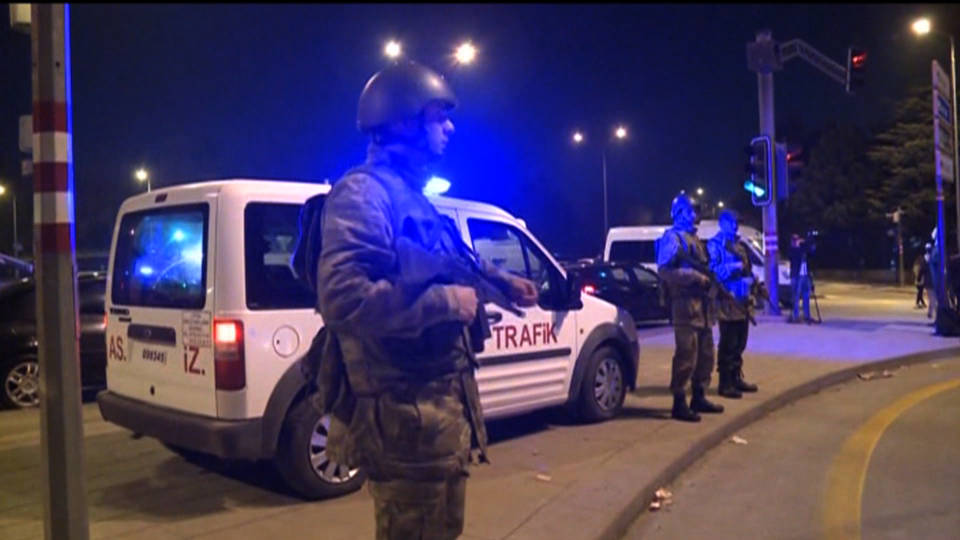
In Turkey, a car bomb has killed at least 28 people and injured more than 60 in the capital Ankara on Wednesday. Twenty of those killed were Turkish military personnel. The Turkish deputy prime minister spoke out.
Deputy Prime Minister Numan Kurtulmus: "We believe that both civilians and soldiers lost their lives in the attack. We will continue to give information to the people as the bodies are identified. Sixty-one citizens have been injured and are being treated in various hospitals."
No one has claimed responsibility for the attack. Turkey has blamed the Kurdistan Workers’ Party, known as the PKK, but a PPK leader says the group was not behind the attack, and does not know who is responsible. Despite the fact that no one has claimed responsibility, Turkish warplanes began bombing northern Iraq within hours after the attack. Turkish authorities say the strikes are targeting PKK camps.
TOPICS:
Turkey
White House: Obama to Visit Cuba in Next Few Weeks
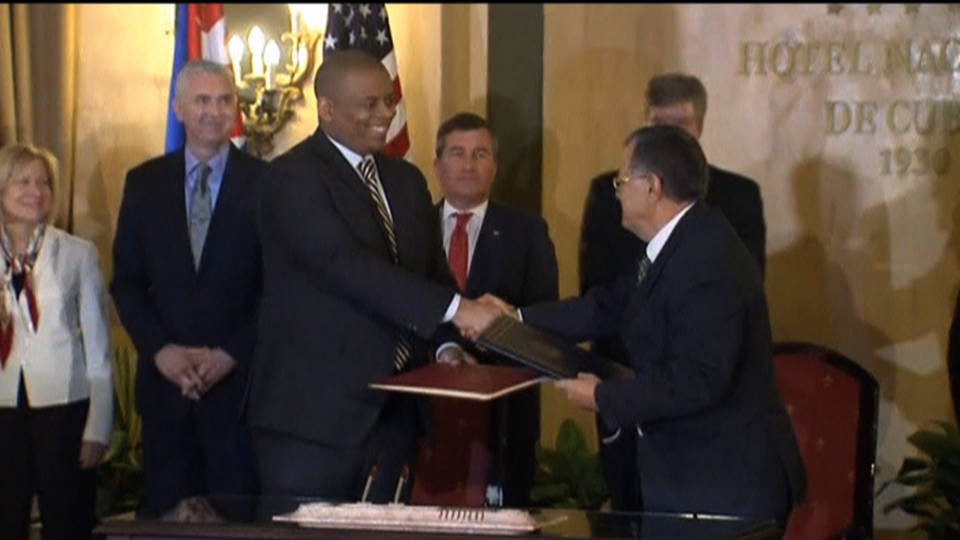
The White House is slated to announce today that President Obama will visit Cuba in the coming weeks. The trip would make President Obama the first sitting U.S. president to visit Cuba in nearly nine decades. This comes amid the normalization of relations between the two countries. Earlier this week, the United States and Cuba signed an agreement to restore regular U.S. commercial flights to Cuba for the first time in more than 50 years. The Obama administration has also approved the first U.S. factory in Cuba in more than 50 years, allowing a company from Alabama to assemble tractors there.
TOPICS:
Cuba
Pope Francis: "Flow of Capital Cannot Decide Flow & Life of People"
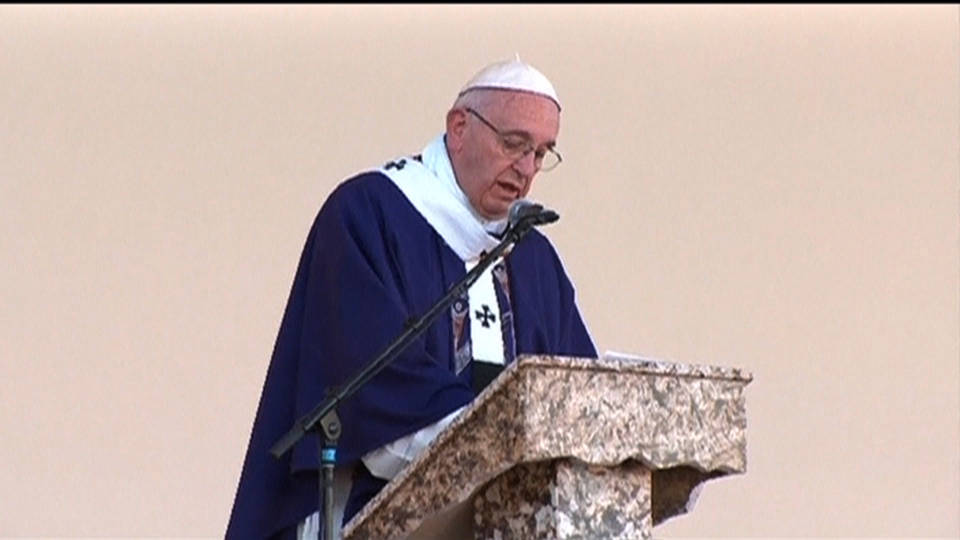
Pope Francis wrapped up his visit to Mexico with a mass in the border city of Juárez, where he spoke out against the "humanitarian crisis" caused by U.S. immigration policies. He spoke near a cross erected in memory of the thousands of people who have died trying to cross the U.S.-Mexico border.
Pope Francis: "A step, a path filled with terrible injustice, enslavement, kidnappings, extortion. Many of our brothers are the fruits of the business of human trafficking. We cannot deny a humanitarian crisis, which in recent years has seen the migration of millions of people."
Pope Francis also criticized the role of capitalism in U.S. border policies, saying: "The flow of capital cannot decide the flow and life of people."
TOPICS:
Pope Francis
Mexico
Immigration
Texas: U.S. Marshals Arrest Man over $1,500 Student Loan Debt
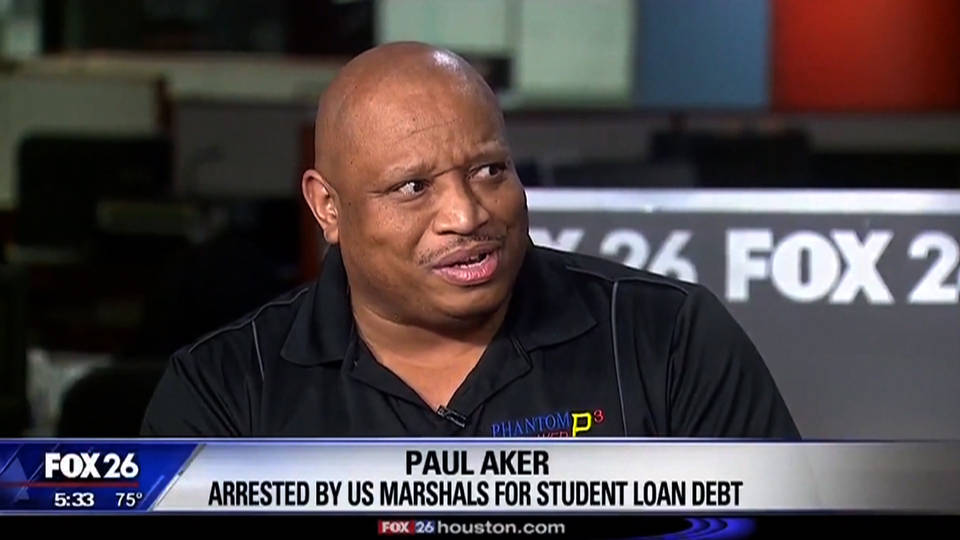
In Texas, U.S. marshals have arrested a man over his federal student loan debt. The federal government has contracted student loan collections to private debt collectors, who have the ability to deploy U.S. marshals. Houston resident Paul Aker says that last Thursday seven armed U.S. marshals arrived at his home, arrested him and placed him in jail over what was initially a $1,500 student loan debt that has been outstanding since 1987. Paul Aker spoke to Fox 26.
Paul Aker: "They took me downtown to the federal court, where they put me in a four-by-four cell for about an hour. And then, an hour later, I was taken before a judge, surrounded by seven marshals."
Isiah Carey: "For a payment agreement?"
Paul Aker: "For a payment agreement."
Isiah Carey: "All of that for a payment agreement?"
Paul Aker: "Absolutely, absolutely. It was just totally mind-boggling. I just couldn’t believe that I’m standing before the court, with no rights read to me, no legal representation, and I’m being told that I owe $1,500, and just couldn’t believe it."
The U.S. Marshals Service confirmed the arrest, saying the agency has been trying to collect the loan for the past three years. Approximately 40 million people in the United States currently have student loan debt.
TOPICS:
Texas
Debt
Student Debt
Yemen: Journalist Killed in Taiz; Drone Strikes Kill 3 in Huta

A Yemeni journalist with the independent Yaman News outlet and the state-run Yemen TV station has been shot to death. Journalist Ahmed al-Shaibani was reporting on the fighting in the city of Taiz. A photographer who was reporting with al-Shaibani says he believes the journalist was purposefully targeted by pro-Houthi rebels. The two were in Taiz to report on a fire in a plastics factory that had been hit by a shell from pro-Houthi fighters. Meanwhile, also in Yemen, a drone strike killed three people in the southern city of Huta on Monday. The attack also badly damaged the offices of public water and telecommunications.
TOPICS:
Yemen
Journalism
2 LAPD Officers Charged with Sexually Assaulting Women While on Duty

Two Los Angeles police officers have been charged with forcible rape and sexual assault of four women. Prosecutors say the attacks primarily occurred while the two officers, James Christopher Nichols and Luis Gustavo Valenzuela, were on duty. The four women had been arrested by the officers for drug-related crimes. The Los Angeles Police Department has been aware the officers may have been sexually assaulting women for nearly three years. Back in 2013, LAPD detectives sought a warrant to confiscate the men’s computers and phones. The warrant alleged that the officers repeatedly threatened women with jail in order to get them to enter an unmarked car the two drove while on duty. The warrant went on to accuse the two officers of driving the women to a secluded area, where they would demand sex. The Los Angeles Times wrote about these allegations against the two officers in 2013, yet it wasn’t until Tuesday that charges were filed against the two officers.
TOPICS:
Police Brutality
Sexual Assault
Report: NYPD Officers Not Complying with New Stop & Frisk Rules
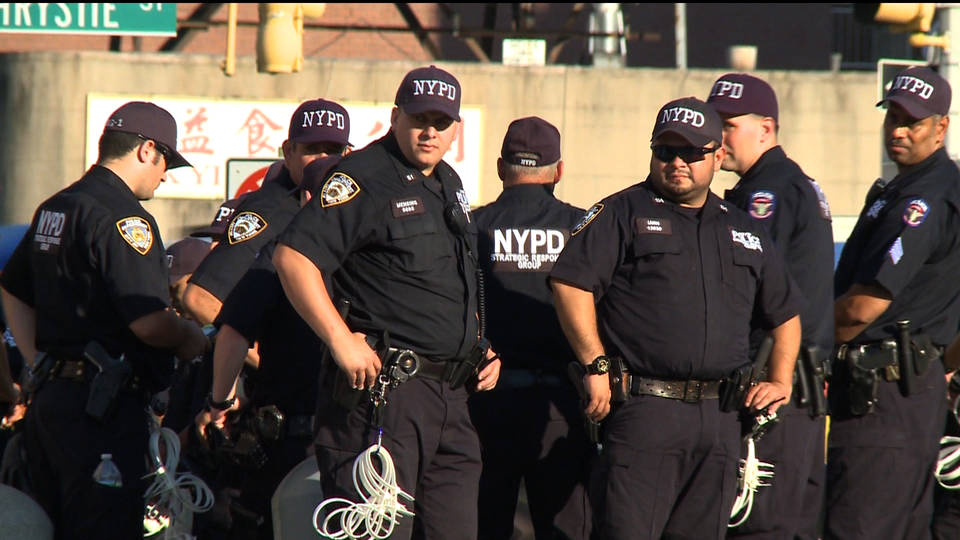
In New York City, a new report filed by a federal monitor appointed to oversee reforms to the New York City Police Department has found many officers have failed to comply with rules for stopping and questioning people on the street. In more than a quarter of cases, police failed to document their initial reason for stopping someone. Officers rarely documented stops that led to arrests. The monitor found, "Many appear not to understand what is expected of them." A landmark 2013 ruling found the New York City Police Department’s stop-and-frisk policy unconstitutional.
TOPICS:
New York
Stop-and-Frisk
KY Rep. Introduces Bill Restricting Access to Erectile Dysfunction Treatment, in Response to Abortion Restrictions

In Kentucky, Democratic state Representative Mary Lou Marzian has introduced a bill that would place significant restrictions on men with erectile dysfunction who are seeking treatments such as Viagra. The bill, introduced last week, would require men seeking erectile dysfunction treatments to first have two doctor visits, provide a signed consent letter from a current spouse and make a sworn statement that he will only use the drugs for sex with his current spouse. The bill would also make all unmarried men ineligible for the treatment. Representative Marzian, who is also a nurse, introduced the legislation after Kentucky Governor Matt Bevin signed a bill requiring women to consult a doctor at least 24 hours before an abortion. Marzian spoke to TV station WDRB.
Rep. Mary Lou Marzian: "When we start invading people’s private lives and private medical decision, to me, it’s: What’s next? ... In the Kentucky General Assembly, there are at least six or seven anti-choice bills filed to restrict access to women’s reproductive health. ... I am appalled that the Kentucky General Assembly, which very few have any medical degrees, feel that it is important that they insert themselves between a woman and her physician."
TOPICS:
Abortion
Report: Number of Hate Groups Surges Amid Election Cycle Marked by Hate Speech

The number of hate groups rose considerably across the United States last year. A new report by the Southern Poverty Law Center found the number of hate groups rose 14 percent last year, bringing the total number of hate groups in the U.S. to nearly 900. The report found the number of Ku Klux Klan groups more than doubled. It also documented 34 anti-Muslim hate groups and 48 anti-LGBTQ hate groups. Report author Mark Potok pointed to the presidential election cycle as one of the primary reasons for a rising number of hate groups across the U.S., saying last year was marked by "hate speech in mainstream politics to an extent that we have not seen in decades. ... White supremacist forums are awash with electoral joy, having dubbed Trump their 'Glorious Leader.'"
TOPICS:
2016 Election
Bolivia: 6 Government Workers Die After Building Lit on Fire After Protest

In Bolivia, six government workers have died of asphyxiation in a suburb of the capital La Paz, after city officials reportedly refused to let them leave a building in advance of a demonstration that ended with the municipal building being set on fire. City workers say they asked to leave before the demonstration arrived, but that the human resources director told them they had to remain inside the building. The demonstration was organized to protest of the conditions of local schools. Organizers say the building was set on fire after protesters dispersed and that infiltrators were to blame for the blaze.
TOPICS:
Bolivia
Libya: Thousands Celebrate Fifth Anniversary of Revolution
In Libya, thousands took to the streets in the capital Tripoli on Wednesday to celebrate the fifth anniversary of the uprising that toppled longtime dictator Muammar Gaddafi. The uprising, known as the February 17 Revolution, ended with a 2011 U.S.-led military intervention that helped oust Gaddafi. Libya slid into conflict soon after. The country currently has two competing governments. In January, General Joseph Dunford, chairman of the U.S. Joint Chiefs of Staff, said he wants to begin taking "decisive military action" against the self-proclaimed Islamic State in Libya.
TOPICS:
Libya
Arab Spring
Ted Cruz and Donald Trump in Feud over South Carolina Campaign Ad
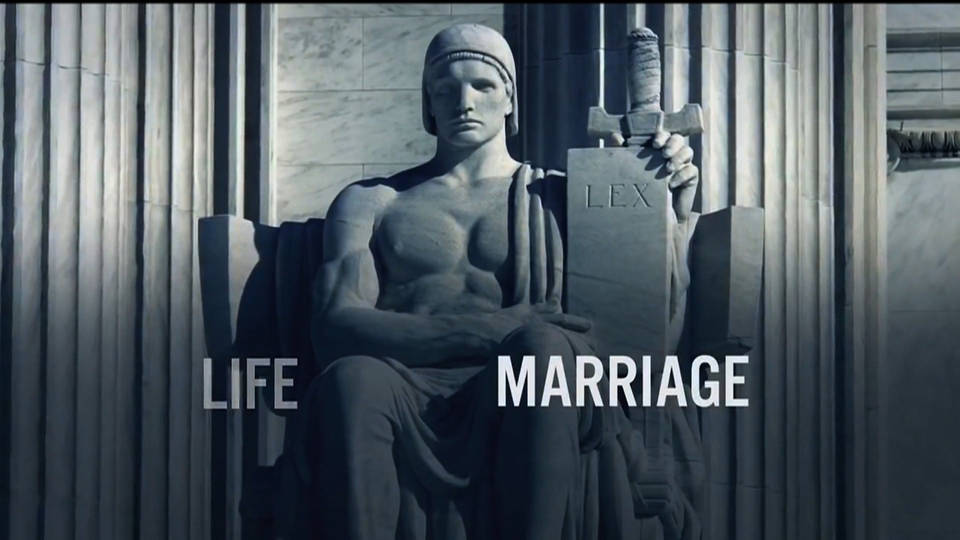
Ahead of the Republican South Carolina primary on Saturday, candidates Ted Cruz and Donald Trump are feuding over a Cruz campaign TV ad that accuses Trump of having been pro-choice in the past. The ad, airing in South Carolina, features a clip from a 1999 Trump interview with NBC’s "Meet the Press." In the interview, Trump says he is "pro-choice in every respect." In response, the Trump campaign sent a cease-and-desist letter to the Cruz campaign. Trump has also threatened to sue Cruz for defamation if the campaign continues to air the ad. A recent Bloomberg poll shows Trump with a 19-point lead over Cruz in South Carolina.
TOPICS:
2016 Election
AFL-CIO Withholds Endorsing a Presidential Candidate

In more news from the campaign trail, the biggest labor federation in the United States, the AFL-CIO, says it is withholding an endorsement for an individual candidate, a move that’s being seen as a victory for Democratic presidential candidate Bernie Sanders. The AFL-CIO was expected to announce its endorsement next week, after a vote by the executive council at the annual winter meeting. But in an email, AFL-CIO President Richard Trumka said the executive council will not be voting at the meeting, saying: "I have concluded that there is broad consensus for theAFL-CIO to remain neutral in the presidential primaries for the time being." The AFL-CIO endorsement is by far the most significant labor endorsement for a presidential candidate. Former Secretary of State Hillary Clinton has won the majority of labor endorsements to date, although National Nurses United has come out endorsing Bernie Sanders.
TOPICS:
2016 Election
Labor
NYC: Protest Against Beyoncé Turns into Pro-Beyoncé Rally
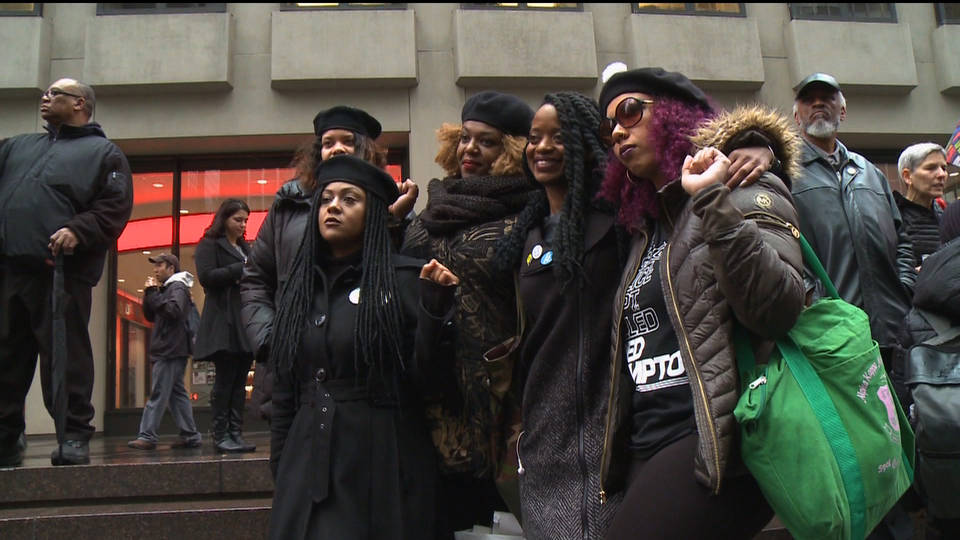
And in New York City, a protest against Beyoncé’s politically charged Super Bowl performance turned into a pro-Beyoncé, anti-racist demonstration Tuesday after Beyoncé’s supporters vastly outnumbered her opponents. The event outside the NFLheadquarters was billed as a protest against "race-baiting" by Beyoncé, whose Super Bowl performance invoked the Black Panthers, Black LIves Matter and Malcolm X. But only about two or three people actually showed up to criticize Beyoncé, while dozens showed up to defend her. This is an exchange between a Beyoncé critic and two supporters.
Beyoncé supporter 1: "So can you go back to when you were telling us the political statement that Beyoncé’s Super Bowl performance made?"
Beyoncé critic: "Yeah, it seemed—it came off—it just came across to me that there was a political statement, which—listen, which is fine. Everybody has that. But this is a football game. Let’s just keep it to a sports game."
Beyoncé supporter 1: "But what was the political statement?"
Beyoncé supporter 2: "Have you seen it since?"
Beyoncé critic: "I’ve seen it on the news a couple of times."
Beyoncé supporter 1: "You know it’s on YouTube."
Beyoncé supporter 2: "Have you seen the entire performance?"
Beyoncé critic: "Start to finish? No, I didn’t see it, start to finish."
Beyoncé supporter 2: "So then you cannot speak as to whether or not it was a political statement."
Beyoncé critic: "OK, fair enough."
Donate today:
Follow:

In more news from the campaign trail, the biggest labor federation in the United States, the AFL-CIO, says it is withholding an endorsement for an individual candidate, a move that’s being seen as a victory for Democratic presidential candidate Bernie Sanders. The AFL-CIO was expected to announce its endorsement next week, after a vote by the executive council at the annual winter meeting. But in an email, AFL-CIO President Richard Trumka said the executive council will not be voting at the meeting, saying: "I have concluded that there is broad consensus for theAFL-CIO to remain neutral in the presidential primaries for the time being." The AFL-CIO endorsement is by far the most significant labor endorsement for a presidential candidate. Former Secretary of State Hillary Clinton has won the majority of labor endorsements to date, although National Nurses United has come out endorsing Bernie Sanders.
TOPICS:
2016 Election
Labor
NYC: Protest Against Beyoncé Turns into Pro-Beyoncé Rally

And in New York City, a protest against Beyoncé’s politically charged Super Bowl performance turned into a pro-Beyoncé, anti-racist demonstration Tuesday after Beyoncé’s supporters vastly outnumbered her opponents. The event outside the NFLheadquarters was billed as a protest against "race-baiting" by Beyoncé, whose Super Bowl performance invoked the Black Panthers, Black LIves Matter and Malcolm X. But only about two or three people actually showed up to criticize Beyoncé, while dozens showed up to defend her. This is an exchange between a Beyoncé critic and two supporters.
Beyoncé supporter 1: "So can you go back to when you were telling us the political statement that Beyoncé’s Super Bowl performance made?"
Beyoncé critic: "Yeah, it seemed—it came off—it just came across to me that there was a political statement, which—listen, which is fine. Everybody has that. But this is a football game. Let’s just keep it to a sports game."
Beyoncé supporter 1: "But what was the political statement?"
Beyoncé supporter 2: "Have you seen it since?"
Beyoncé critic: "I’ve seen it on the news a couple of times."
Beyoncé supporter 1: "You know it’s on YouTube."
Beyoncé supporter 2: "Have you seen the entire performance?"
Beyoncé critic: "Start to finish? No, I didn’t see it, start to finish."
Beyoncé supporter 2: "So then you cannot speak as to whether or not it was a political statement."
Beyoncé critic: "OK, fair enough."
Donate today:
Follow:

"Thirsty for Democracy: The Poisoning of an American City": Complete Democracy Now! Special on Flint
COLUMN

"Voices From the Front Lines of the Flint Water Crisis" by
Amy Goodman & Denis Moynihan
Michigan Gov. Rick Snyder’s successive emergency managers are now gone from Flint, but the wreckage of their rule there still pollutes many homes. The crisis in Flint is, on the surface, about water. In April 2014, the city switched from the Detroit water system, which it had used for more than 50 years, to the Flint River, ostensibly to save money. The Flint River water made people sick, and is likely to have caused disease that killed some residents. The corrosive water, left untreated, coursed through the city’s water system, leaching heavy metals out of old pipes. The most toxic poison was lead, which can cause permanent brain damage. The damage to the people of Flint, the damage to the children who drank and bathed in the poisoned water, is incalculable. The water is still considered toxic to this day.
The Flint debacle also is about democracy. As a team of us from the “Democracy Now!” news hour traveled to Flint last weekend to report on the crisis, we received a text message from a native son of that city, Oscar-winning filmmaker Michael Moore. “Lead isn’t the poison in Michigan. Fascism is,” Michael wrote. “How do u toss a democratic election in the garbage and get away with it?”
Moore had just visited Flint to help organize a rally calling for the arrest of the governor. Rick Snyder ran for governor in 2010 as a fiscal conservative, and won in the tea-party wave of electoral victories that year. He pushed for a strengthened emergency-manager law, which would give him broader powers to take over city governments and school districts that were deemed (by a board that Snyder appointed) to be in a state of “financial emergency.” The governor could then appoint an emergency manager with sweeping powers, overriding elected city councils and mayors, imposing severe austerity measures, selling off public assets and breaking existing contracts with labor unions. He did this primarily in black communities.
“We don’t have just a water problem. We’ve got a democracy problem. We’ve got a dictatorship problem,” Claire McClinton told me in Flint. She is a lifelong resident of the city, from a union family, and a lead organizer with the Democracy Defense League. She and her group were meeting just across the Flint city line at a restaurant in Flint Township, which never switched off the Detroit water. As they met, a woman approached them. Kawanne Armstrong was visibly upset, desperate to get clean water for her newborn grandson. Audrey Muhammad, one of those attending the meeting, offered her water that she had just bought for herself, which she had in her car. These two women, both, like 60 percent of Flint’s residents, African-American, walked into the bitter cold to move gallon jugs of water from one car trunk to another. “It’s for my grandson. He was born February 6. ... That’s my concern,” Armstrong told us.
We left that meeting and went to a Catholic church in Flint, where scores of people were preparing to head out, canvassing door to door to distribute water and water filters, and to assess the needs of each household. Union members from Detroit, social workers and plumbers from Ann Arbor, and many Flint residents were volunteering their time on a bitter-cold winter Saturday afternoon.
Last October, under enormous pressure, the governor was forced to switch Flint’s water back to the Detroit source, but the damage to the pipes has been done, and toxins continue to leach into the water. Melissa Mays was in the church, as a founder of Water You Fighting For, an activist group. “All three of my sons are anemic now. They have bone pain every single day. They miss a lot of school because they’re constantly sick. Their immune systems are compromised,” she told us. She, too, is sick. “Almost every system of our bodies have been damaged.” Despite her illness, she was out helping others.
The emergency manager is now gone, and the people of Flint have elected a mayor, Karen Weaver, who can actually represent them. She immediately declared a state of emergency, focusing national media attention on the crisis. She has demanded $55 million to jump-start the immediate repair of Flint’s water system. Gov. Snyder has countered with a fund of $25 million, and insists that it be spent on contractors of his choice—conditions that Weaver rejects. “We’re going to get rid of these lead pipes one house at a time, one street at a time, one neighborhood at a time, until they are all gone,” Mayor Weaver said. “We cannot afford to wait any longer.”
Two parallel investigations, state and federal, are underway in an attempt to determine if any crimes have been committed. The first step to healing Flint has been taken, though: the restoration of democratic control. All else will flow, like water, from that.
SPEAKING EVENTS
2/22 Columbus, OH
WORK WITH DN!

Broadcast Engineer
Director of Finance and Operations
Director of Development
---------------------
207 West 25th Street, 11th Floor
New York, New York 10001, United States
----------------------------
----------------------------




No comments:
Post a Comment